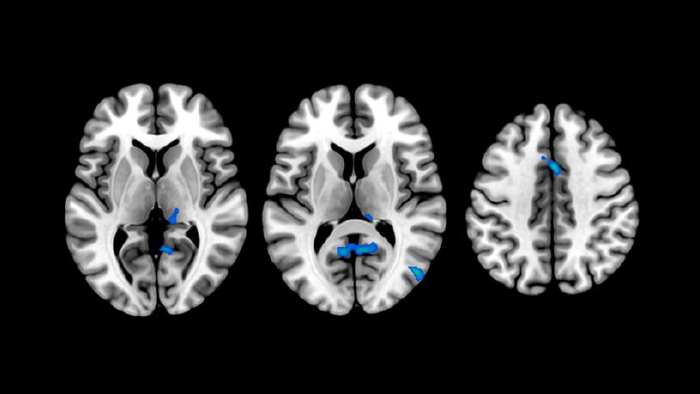07 Jan | 2020
New study finds changes in brain structure and cognition in people with insomnia

Changes in brain structure in people with insomnia
People with insomnia have changes in cognitive performance and brain structure, especially in the white matter and some regions that are affected in the early stages of Alzheimer’s disease. This is what a new research by the Barcelonaβeta Brain Research Center (BBRC), the research center of the Pasqual Maragall Foundation, describes in a new publication in the journal Alzheimer’s Research and Therapy. It has been possible thanks to the impulse of “la Caixa” Foundation.
On the one hand, researchers analyzed the cognitive performance of people with insomnia and compared it with that of people with normal sleep. The results show that insomnia is associated to worse results in cognitive tests. In particular, they have described a reduction in some executive functions such as working memory.
On the other hand, thanks to magnetic resonance imaging, the study shows that participants with insomnia have a lower volume in some brain regions. Among them are the precuneus or the posterior cingulate cortex, which are affected in the early stages of the disease. The results support previous research that related insomnia with higher vulnerability to Alzheimer’s disease.
The present study has also found changes in brain white matter by using diffusion-weighted imaging. “These findings suggest the presence of brain inflammation processes that could have an important role in the association between sleep quality and Alzheimer’s”, highlights Dr. Oriol Grau, first author of the study. The publication of these results opens the door to a new line of research that has not been explored yet and will help to understand the relationship between neuroinflammation, sleep and dementia.
Finally, researchers analyzed the relationship between insomnia and the genetic variant APOE-ε4. The APOE gene has three possible variants or alleles (ε2, ε3 and ε4) and ε4 variant confers higher risk of Alzheimer’s. The results of this study show that the effects of insomnia on the brain are enhanced in people who carry APOE-ε4 and, therefore, have a higher risk of developing the disease.
This research has analyzed data regarding sleep quality and results in cognitive and neuroimaging tests of 1,683 adults without cognitive alterations who take part in the Alfa Study, supported by “la Caixa” Foundation. 615 of them had insomnia.
The study has also been possible thanks to the participation of researchers from IDIBAPS and the collaboration of the CIBER on Bioengineering, Biomaterials and Nanomedicine (CIBER-BBN) and the CIBER on Fragility and Healthy Aging (CIBER-FES).
Results that are the basis for new research
This study establishes the basis for the development of a new research line that will allow a more comprehensive study about sleep quality in the Alfa cohort. It will use objective measures of sleep and new biomarkers of Alzheimer’s disease. The aim of this new research is to understand how sleep quality is related to the vulnerability to cognitive impairment associated with Alzheimer’s disease and the role of brain inflammation in this process.
According to Dr. José Luis Molinuevo, Scientific Director of Alzheimer’s Prevention Program of the BBRC, “the knowledge generated by this new line could significantly contribute to a better understanding of the pathophysiology of Alzheimer’s disease, improve early diagnosis through minimally invasive methods and establish the basis for future therapeutic strategies focused on improving sleep quality”.
Insomnia and Alzheimer’s
Insomnia is a disorder characterized by difficulty initiating or maintaining sleep, which causes an impairment of daytime functioning. Epidemiological studies estimate that between 4 and 20% of the general population has insomnia.
Previous studies in the field of dementias have found an association between poor sleep quality and the risk of dementia. Currently, one of the focuses in Alzheimer’s research is the study of sleep quality, either as a risk factor or as an early manifestation of the disease.











